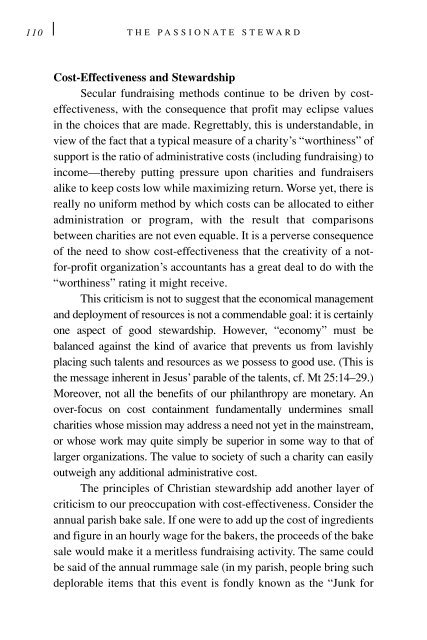Passionate Steward - 10th Anniversary Edition
10th Anniversary Edition of The Passionate Steward - Recovering Christian Stewardship from Secular Fundraising (St. Brigid Press - 2002).
10th Anniversary Edition of The Passionate Steward - Recovering Christian Stewardship from Secular Fundraising (St. Brigid Press - 2002).
Create successful ePaper yourself
Turn your PDF publications into a flip-book with our unique Google optimized e-Paper software.
110 THE PASSIONATE STEWARD<br />
Cost-Effectiveness and <strong>Steward</strong>ship<br />
Secular fundraising methods continue to be driven by costeffectiveness,<br />
with the consequence that profit may eclipse values<br />
in the choices that are made. Regrettably, this is understandable, in<br />
view of the fact that a typical measure of a charity’s “worthiness” of<br />
support is the ratio of administrative costs (including fundraising) to<br />
income—thereby putting pressure upon charities and fundraisers<br />
alike to keep costs low while maximizing return. Worse yet, there is<br />
really no uniform method by which costs can be allocated to either<br />
administration or program, with the result that comparisons<br />
between charities are not even equable. It is a perverse consequence<br />
of the need to show cost-effectiveness that the creativity of a notfor-profit<br />
organization’s accountants has a great deal to do with the<br />
“worthiness” rating it might receive.<br />
This criticism is not to suggest that the economical management<br />
and deployment of resources is not a commendable goal: it is certainly<br />
one aspect of good stewardship. However, “economy” must be<br />
balanced against the kind of avarice that prevents us from lavishly<br />
placing such talents and resources as we possess to good use. (This is<br />
the message inherent in Jesus’ parable of the talents, cf. Mt 25:14–29.)<br />
Moreover, not all the benefits of our philanthropy are monetary. An<br />
over-focus on cost containment fundamentally undermines small<br />
charities whose mission may address a need not yet in the mainstream,<br />
or whose work may quite simply be superior in some way to that of<br />
larger organizations. The value to society of such a charity can easily<br />
outweigh any additional administrative cost.<br />
The principles of Christian stewardship add another layer of<br />
criticism to our preoccupation with cost-effectiveness. Consider the<br />
annual parish bake sale. If one were to add up the cost of ingredients<br />
and figure in an hourly wage for the bakers, the proceeds of the bake<br />
sale would make it a meritless fundraising activity. The same could<br />
be said of the annual rummage sale (in my parish, people bring such<br />
deplorable items that this event is fondly known as the “Junk for




